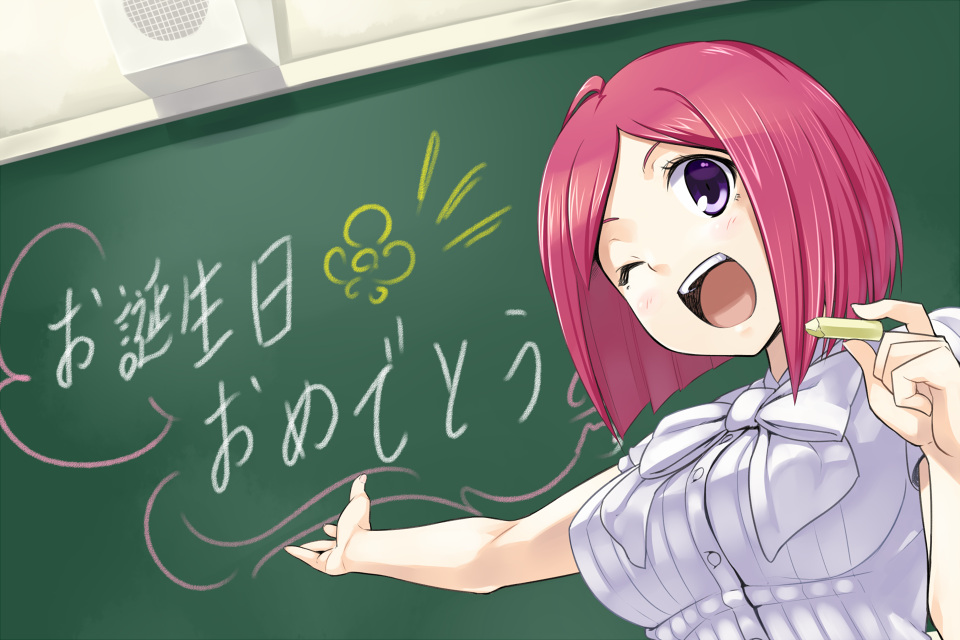Whether you are just getting into Anime or are a veteran viewer, you may or may not know of most of the terms when reading about your favorite new show or when reading on various anime news sites. Brush up on your terminology or learn something new with our list below. We will be updating this list if we missed anything and trying to provide as complete of a resource as possible.
Common Character Roles
- kohai (mentee) | Student of senpai.
- senpai | A mentor.
- sensei | A teacher. Ex: Jaraiya from Naruto.
Common Descriptors



- chibi | Small, aka kawaii (cute).
- fan service | Provocative scene or cut-scene to entertain the audience such as close up view of bust or view from behind, skirt view, etc.
- waifu | Essentially an anime character/lady that is “wifey material”. Someone you would marry, if given the chance!
Common Words/Phrases
- baka! | Dummy, idiot.
- itai! | Shouted when pain is felt or getting hurt.
- nani?! | What, huh?
- urusai! | Noisy in a sentence, shut-up on the phone.
- zettai! | Determination, resolve. Absolutely and positively!.
Culture
- matsuri (festival) | Dress up in casual kimono (yukata), and/or traditional Japanese clothes.
Emotional Attributes
- dere | Emotional characters that tend to be on one extreme or the other of the emotional spectrum.
- tsundere | Also known as “tough love”. The character will not tolerate their lover well, but always wants to be lovey with them.
- yandere | Start out nice, sweet, cute and cuddly. End violent and hateful if they feel threatened in their relationship with their loved one.
Culture Foods
- ramen | Japanese noodle soup. Usually served with a beef or chicken based broth.
- rice cakes | Condensed rice. Nom nom nom.
- mochi | Another variant of the rice cake.
Emotional Attributes
- dere | Emotional characters that tend to be on one extreme or the other of the emotional spectrum.
- tsundere | Also known as “tough love”. The character will not tolerate their lover well, but always wants to be lovey with them.
- yandere | Start out nice, sweet, cute and cuddly. End violent and hateful if they feel threatened in their relationship with their loved one.
Fandoms
- doujinshi | Fan and supporter published work that often portray popular dream relationships or alternate interesting storylines.
Honorifics



- -chan (informal) | Mostly used to reference friends, family, and kids.
- -kun | Male form of -chan, describing a less cute version and more stern.
- -sama (formal) | The highest level of formality. Used to reference Kings, Queens, Gods, etc. quite often in different Anime series.
- -san (formal) | An acquaintance formality, used most commonly in public, friends, colleagues, etc.
Genre
- fantasy | Dreamy worlds and far out fictional experiences that would never happen in normal real life. Ex: Sword Art Online.
- horror | Self-explanatory! Potentially gory with a side of scare. Scenes keeping you on the edge of your seat, afraid to get up and get popcorn.
- lolita | Victorian style anime theme and clothing.
- mystery | Thrillers and ‘on the edge’ plots that keep the viewers guessing. Most notably, Death Note.
- shoujo | Mainly for the young female audiences. Focusing primarily on love and relationship story-lines.
- shounen | The majority of the popular Anime today. Geared towards young male audiences with action-packed story-lines. Examples of this include Anime such as Dragon Ball / Z / Super, Bleach, One Punch Man, and many more.
- slice of life | Mundane normal everyday life experiences in art and entertainment.
- romance | As the title depicts, romances focused story-lines geared towards love and relationships.
- yaoi | Anime geared towards Homoerotic relationships and story-lines.
- yuri | Anime geared towards Lesbian relationships and story-lines.
Industry Terms
- anime | Animated tv shows, movies, ova’s etc from Japan.
- simulcasting | Anime that is currently airing regularly, either daily, weekly, monthly etc.
- subbed | Anime that is in its original form with Japanese audio and English or different language subtitles.
- dubbed | Anime that has voice-overs in a different language than its original. Often English Dubbed versions are popular.
- j-pop | Japanese pop music, used regularly for anime theme songs.
- k-pop | Korean pop music, similar to J-Pop!
- manga | Essentially comics done with Japanese style, usually in black and white and most commonly read from right-to-left.
- otaku | In Japan, this means you’re a vegetable, nonfunctional fanboy, but in the USA this means you’re a hardcore anime/manga fanboy.
Sub-Genre
- isekai | Sub-genre to fantasy, mostly pertaining to when a character is flung into an alternate universe, dimension, world, etc.
- mecha | Sub-genre to sci-fi, centering around the idea and or implementation of robots, machines, etc. Most widely known anime in this sub-genre is Gundam Wing.
- ecchi | Sub-genre to romance, mostly sexually suggestive with the main characters having possibly multiple relationships with other secondary characters.
- seinen | Literally meaning “young men”, this is a sub-genre of manga geared towards younger males.
- josei | Sub-genre of manga, geared towards older women teenagers and adult women.
- shounen/shoujo-ai | Sub-genre of yaoi/yuri, normally used to depict different levels of intimacy in the relationships.
Various Taboos
- sibling | Obvious by the meaning, but this involves relationships between siblings, half, step, or regular.
- parental | Relationship between parent/child through step/regular, etc.
Further reading and other Resources:
https://www.cbr.com/must-know-industry-terms-anime/
https://geekandsundry.com/your-anime-vocabulary-starter-guide/

